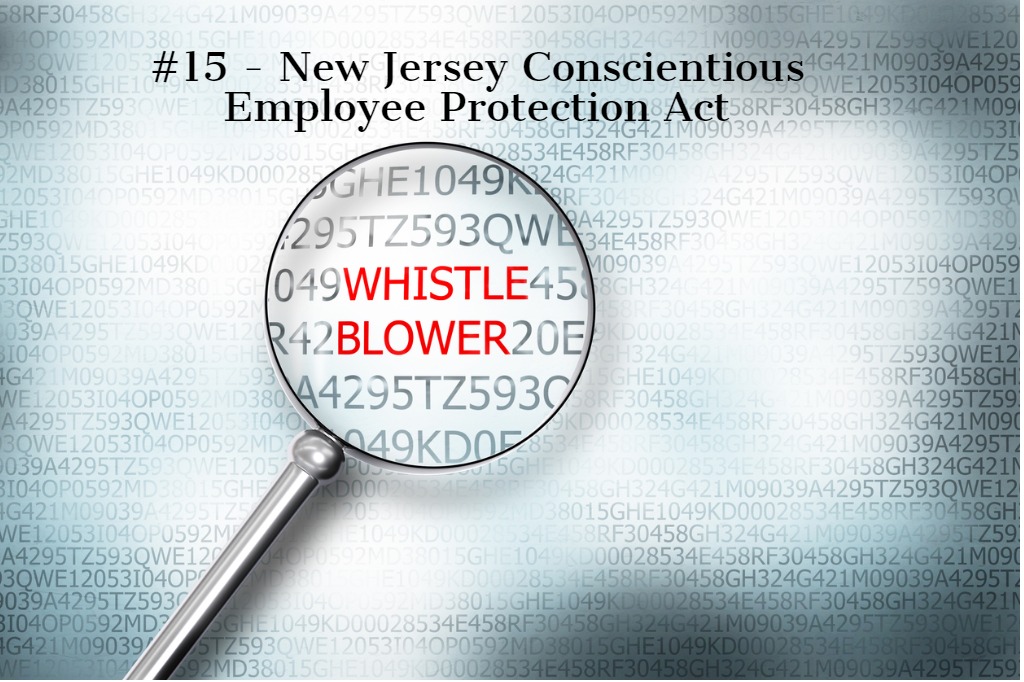#15 of Genova Burns 30th Anniversary Countdown Narrative
The New Jersey Conscientious Employee Protection Act
October 30, 2019
The Conscientious Employee Protection Act (CEPA) is an expansive, powerful New Jersey whistleblower law that protects employees from employer retaliation including, but not limited to, being fired, demoted, passed over for a promotion, or even harassed because the employee made light of and brought attention to operational and functional issues they reasonably believe violates the law.
Under the statute, an employee who witnesses a violation of law or regulation on the job has the freedom to report the violation to government entities or supervisors in New Jersey. Employees who suffer retaliation are entitled to relief, including back pay, front pay, pain and suffering, punitive damages, and reimbursement of attorney fees.
CEPA prohibits employers from retaliating against employees who disclose, object to, or refuse to participate in certain actions that they reasonably believe are illegal or violate public policy. While the Act was designed primarily to protect employees, if utilized properly, it can protect employers as well by drawing their attention to troublesome issues that need correcting.
REGULATORY SUMMARY:
The New Jersey Conscientious Employee Protection Act (N.J. Stat. § 34:19-1 (2007)) has been interpreted to become one of the most protective whistleblower statutes in the country. It offers protection for employees who disclose illegal activities performed by the company or its employees; disclose improper quality of care by healthcare professionals; provide information or offer testimony about illegal activities; provide information about deception/misrepresentation to shareholders and other interested populations; provide information about fraudulent/criminal activity, and those who refuse to participate in illegal conduct.
Employees who avail themselves of the protections under the statute, even if they are incorrect about the activity reported, are still protected, as long as they had an “objective reasonable belief” that illegal and/or fraudulent conduct occurred. The Statute has been read so broad as to protect nearly all employees, even those considered independent contractors, and the protections cover those in both the public and private sectors.
Employee claims for CEPA violations are required to demonstrate the following:
- a reasonable belief that the employer's conduct was violating either a law, rule, regulation, or public policy;
- the employee performed a “whistle blowing” activity;
- employee was subject to an adverse employment action; or
- there is a casual connection between the adverse action and the whistle-blowing activity.
Under CEPA, employers are required to advise employees of their rights and protections under CEPA by conspicuously displaying the CEPA Notice, in both English and Spanish, in a place accessible by all employees. In addition, employers with 10 or more employees are required to distribute a copy of the CEPA Notice to all employees on an annual basis. For CEPA compliance, there is no requirement that employers obtain a signed acknowledgment that the employee has received, reviewed and understands the CEPA Notice. Nonetheless, employers traditionally ask their employees to acknowledge receipt and understanding as documentation that they did in fact comply with the annual requirement.
In order to ensure full compliance, employers should include the Gender Equity Notice and CEPA Notice in their new hire packets and as part of its materials annually circulated to employees, along with the appropriate acknowledgment form. While CEPA has been in effect for a number of years, rulings on CEPA claims and other CEPA-related court cases have required that the state legislature continue to modify the protections and offer important regulatory updates.
Copies of the CEPA Notice are publically available from the New Jersey Department of Labor’s website.
Tags: GENOVA BURNS LLC • Whistleblower • Labor and Employment • Employment Law • Employment Law & Litigation

.jpg)